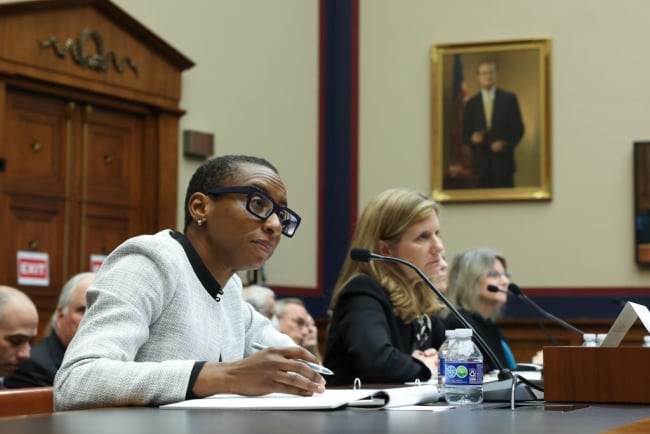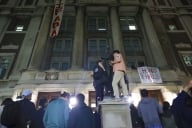You have /5 articles left.
Sign up for a free account or log in.

Harvard president Claudine Gay, in the foreground, has been widely criticized for her responses to questions at a Dec. 5 congressional hearing on antisemitism on campuses.
Kevin Dietsch/Getty Images
“Does calling for the genocide of Jews violate Harvard’s rules of bullying and harassment, yes or no?” Instead of rising to the moment at a high-profile congressional hearing, Harvard president Claudine Gay ducked into a nearby legal hedge and crouched. The Economist put it kindly: “Sometimes you get the technicalities right but still flunk the test.” What test was flunked? The test of presidential leadership.
Is the era of the visionary college president gone forever—replaced by the corporatist imperatives of the modern university? Perhaps not. University presidents today have in their reach a resource that could elevate their voices in society once again. This resource lies in a surprising place: the doctrine of institutional neutrality.
Before the calamitous congressional testimony, college presidents were under public scrutiny for their visible failure of a different test: after years of issuing statements on an ever-growing range of public issues—typically from a progressive perspective—the Hamas attack and Israeli military response left college presidents across the country stuttering. At Cornell University, for example, the administration released three official statements in six days, each one differing significantly in content and tone (here and here).
Finally confronted with a topic on which they could find no safe thing to say, several college presidents adopted a policy of saying nothing (here, here and here). The principled version of this policy is provided by the doctrine of institutional neutrality. Adopting this policy, which says that university leaders should not take positions on social and political controversies, is widely regarded as akin to taking a vow of silence. However, along with constraining presidential speech, institutional neutrality can also require speech, and speech of a uniquely elevated kind. And here college presidents may discover a resource of great value.
The classic formulation of institutional neutrality is the University of Chicago’s Kalven Report of 1967. According to the Kalven Report, universities have an important role to play in the improvement of society, a role defined by the university’s unique mission: “the discovery, improvement, and dissemination of knowledge.” But the pursuit of knowledge is intrinsically upsetting to established understandings. Thus Kalven says,
“A university faithful to its mission will provide enduring challenges to social values, policies, practices, and institutions. By design and by effect, it is the institution which creates discontent with the existing social arrangements and proposes new ones. In brief, a good university, like Socrates, will be upsetting.”
And yet, the report goes on, the “instrument of dissent” is not the university as a collective: it is the individual scholar. Again from Kalven: “The university is the home and sponsor of critics; it is not itself the critic.” To perform its Socratic mission, the university "must sustain an extraordinary environment of freedom of inquiry.”
Less noticed, the Kalven Report recognizes that the policy of “not-speaking” must sometimes be relaxed so that university leaders may defend the principle of free inquiry itself. Thus, “From time to time instances will arise in which the society, or segments of it, threaten the very mission of the university and its values of free inquiry. In such a crisis, it becomes the obligation of the university as an institution to oppose such measures and actively to defend its interests and its values.”
Let’s return to the congressional question with which we began: “Does calling for the genocide of Jews violate Harvard’s rules of bullying and harassment, yes or no?” How might a university president with the truth-seeking role of the university foremost in mind have responded to that question?
At a glance, such a president would notice that this question elides two different questions. One is whether Harvard’s rules allow direct threats, incitement to violence or personalized harassment against Jewish students on campus. The answer is (or should be) a clear no. But that question was tucked within a much broader and more difficult one: Should a campus code of conduct forbid speech that most people on campus find offensive and even vile?
That broader question, raised at a congressional hearing, and during a period of extreme tension on campus, looks very much like a call for a sweeping speech code. Thus, our imaginary president would recognize that she was confronting a moment of crisis like those predicted by the Kalven Report, when “the society, or segments of it, threaten the very mission of the university and its values of free inquiry.” At such a moment, our imaginary president would understand that she has a solemn obligation to defend the university and its truth-seeking mission. Here is how such a leader might respond:
“True threats and incitements to violence are forbidden by our Code of Conduct. But, Congresswoman, are you suggesting that Harvard impose a more general speech code? Don’t you understand that speech codes have a way of biting those who impose them? If Harvard bans ‘calls for the genocide of Jews’—your broad phrase—who will determine what speech will be forbidden: chanting ‘from the river to the sea’ or ‘Palestine must be free’? What about waiving a Palestinian flag, or wearing a black-and-white kaffiyeh? And if Harvard follows your lead and bans those forms of ‘genocidal’ speech, must it police forms of speech that other groups deem ‘genocidal’? Is support for Israeli military action ‘genocidal’? Is the slogan ‘My body, my right’ a call for genocide of the unborn? Is the statement ‘there are two biological sexes, male and female’ a call for genocide of trans people? Where will it end?
“Yes, universities have failed to apply their existing rules against true threats and harassment in a consistent manner, and many students are suffering from this failure. But the remedy you propose strikes at the very heart of the university and the search for truth. Would you use this moment of public anger to erode an ideal of open discourse at our universities that is already under threat? Congresswoman, have you no shame?”
Of course, claiming the high ground of free speech and open inquiry would be more effective if one’s institution actually lives those values. Here, too, today’s college presidents will find that opportunities for leadership abound.








